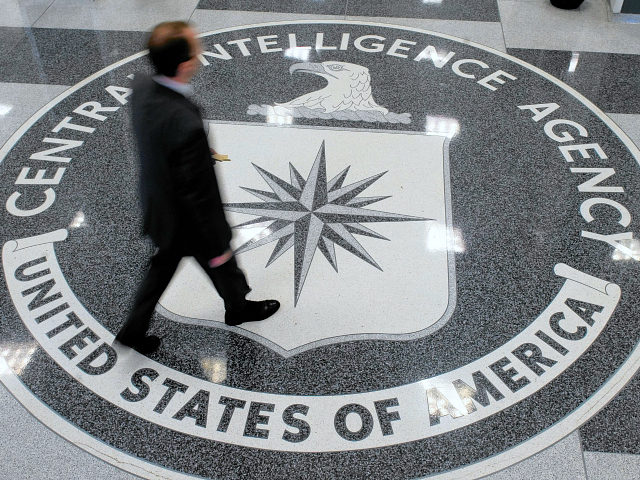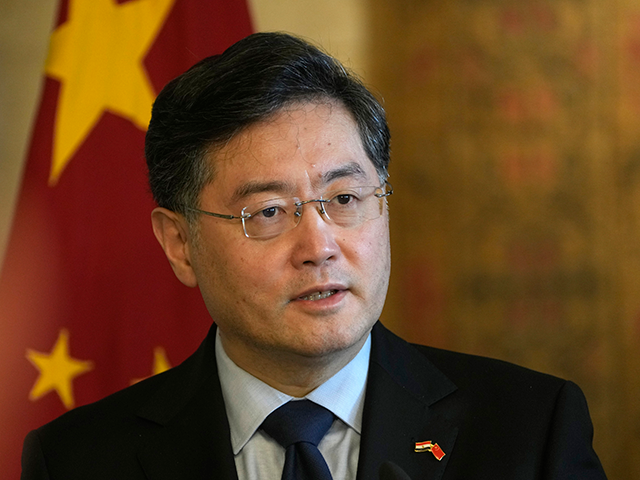The Chinese Ministry of State Security claimed in a social media post on Monday that it had identified an “official of a national ministry” who had provided the American Central Intelligence Agency (CIA) with intelligence from a “critical unit” of the ministry in question.
The Ministry of State Security identified the CIA spy as a 39-year-old named “Hao” and claimed that the case “is under investigation” without specifying if Hao was in police custody, what ministry Hao allegedly helped the CIA infiltrate, or whether or not the Chinese Communist Party believed Hao was the only Chinese national involved in the alleged espionage. The Chinese state newspaper Global Times appeared to identify Hao as a man.
“Following the discovery of Hao’s espionage activities by one of China’s national security agencies, a lawful inquiry has been initiated into his actions in accordance with law, and the case is under investigation,” the Global Times reported.
“Hao” is the second person the Chinese Ministry of State Security has publicly identified this month as a Chinese national “flipped” by the CIA to be used as an American asset. On August 11, the ministry claimed to identify another person known as “Zeng” who similarly faced presumably criminal accusations of cooperating with the CIA.
The accusations follow the launch of a campaign by the Chinese Communist Party to pressure the general public to engage in “counter-espionage” activities. The Ministry of State Security debuted a page of the regime-controlled social media site WeChat in early August meant to make the law enforcement and anti-espionage agency a constant presence in the lives of ordinary Chinese people. The WeChat page also allows citizens to levy accusations against others they believe may be foreign spies.
The Chinese government claimed that the CIA successfully turned Hao into a spy when he was a student in Japan. An alleged CIA agent named “Ted” fostered a friendship with Hao in which “Ted” paid Hao to help him write papers, the government said. Ultimately, “Ted” allegedly introduced Hao to another CIA agent with whom Hao signed an agreement to enter a “critical unit of the Chinese national ministry” and regularly provide intelligence. Hao allegedly received “assessment and training from the U.S.”
As told by the Global Times, the alleged spy identified as “Zeng” became a CIA asset in a similar manner. Zeng allegedly worked for a “Chinese military industrial group” and had access to confidential information that he or she was providing to a CIA agent named “Seth,” the state propaganda outlet reported on August 11. Unlike Hao, whom the Ministry of State Security accused of sharing intelligence for money, the Communist Party accused “Zeng” of adopting “Western values” and renouncing communism.
“Zeng gradually became psychologically dependent on Seth, and Seth took advantage of this to instill Western values into Zeng. Under Seth’s solicitation, Zeng’s political stance was shaken,” the Global Times claimed. The newspaper also alleged that, given his newfound stand as a dissident, Seth offered Zeng help getting his entire family out of China, which regularly commits human rights atrocities against suspected anti-communist dissidents and their families.
Other outlets later identified the suspect in that case as 52-year-old Zeng Moumou, who worked for several defense contractors and allegedly had contact with officials in NATO. Zeng was also identified as male; it is unclear at press time whether Zeng is in police custody or facing legal punishment of any kind.
The Ministry of State Security used its WeChat account to announce the investigation of both cases. The WeChat account debuted on August 1 as a way to bombard the general Chinese public with anti-espionage propaganda, pressure Chinese citizens to notify the government of anyone they suspect may be working with the American or other governments, and maintain a watchful, constant presence over the citizenry. WeChat is a social media application that combines payments, private and public messaging, and sharing photo and video content.
“Despite its name, which makes it sound like a messaging service, this one app dominates almost every facet of a person’s daily online existence in China—banking, dating, gaming, music, shopping, social media,” Bloomberg detailed in July 2022, citing its clear use as a national surveillance tool for the Communist Party.
In its first message on WeChat, the Ministry of State Security announced “that counter-espionage work requires the mobilization of all parts of society, which also combines the ‘open work’ and ‘secret work’ as well as the specialized work with the mass public work,” the Global Times translated.
“National security is the foundation of national rejuvenation. It adheres to the overall national security concept and resolutely safeguards national sovereignty, security, and development interests,” the agency asserted, adding that all Chinese citizens have an “obligation” to help weed out spies.
In its reporting on the WeChat page, the Global Times admitted that the Communist Party was “facing a very severe and complex situation in preventing espionage activities,” conceding that American officials were succeeding in infiltrating key areas of the Chinese government. China passed a new “Counter-Espionage Law” in July to address the alleged triumphs of American and other spies; the law essentially turns all organizations in the country into partners of the Ministry of State Security.
In demanding improved “counter-espionage” work, the Chinese government has repeatedly cited comments by CIA Director William Burns in July in which he claimed to be pleased with “progress” his agents were making in the country.
“We’ve made progress and we’re working very hard over recent years to ensure that we have strong human intelligence capability to complement what we can acquire through other methods,” he said in remarks at the Aspen Security Forum.
“This is rather concerning,” Chinese Foreign Ministry spokeswoman Mao Ning said on July 24 when asked about Burns’s comments. “The US on the one hand keeps spreading disinformation on so-called ‘Chinese spying and cyber attacks,’ and on the other hand tells the public about its large-scale intelligence activities targeting China. This in itself is quite revealing.”
“China will take all measures necessary to safeguard national security,” Mao promised.
China is constantly purging government officials for a variety of public reasons, from espionage (such as Hao and Zeng) to corruption, and often for no reason at all. A day after Mao’s comments on the CIA, Mao’s then-boss, Foreign Minister Qin Gang, disappeared. The Chinese government made a brief statement a month later announcing that Qin had been removed from the position, abruptly replaced by former and once-again Foreign Minister Wang Yi, with no explanation for why or what his fate would be. The Communist Party erased Qin from the Foreign Ministry website and Qin remains missing at press time.


COMMENTS
Please let us know if you're having issues with commenting.